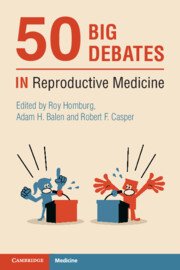Book contents
- 50 Big Debates in Reproductive Medicine
- Series page
- 50 Big Debates in Reproductive Medicine
- Copyright page
- Contents
- Contributors
- Foreword
- Introduction
- Section I Limits for IVF
- Section II IVF Add-ons
- 5A DHEA Is an Effective Treatment for Poor Responders
- 5B DHEA Is an Effective Treatment for Poor Responders
- 6A The Addition of LH/hCG to FSH Improves IVF Outcome
- 6B The Addition of LH/hCG to FSH Improves IVF Outcome
- 7A Acupuncture Is a Useful Adjuvant for Fertility Treatment
- 7B Acupuncture Is a Useful Adjuvant for Fertility Treatment
- 8A There Is a Role for Pre-conceptional Treatment with CoQ10
- 8B There Is a Role for Pre-conceptional Treatment with CoQ10
- 9A There Is a Role for Pre-conceptional Treatment with Vitamin D
- 9B There Is a Role for Pre-conception Treatment with Vitamin D
- 10A Natural Killer Cell Assay in the Blood Is a Useless Investigation
- 10B Natural Killer Cell Assay in the Blood Is a Useless Investigation
- 11A Intralipid Therapy Has a Place in Infertility Treatment
- 11B Intralipid Therapy Has a Place in Infertility Treatment
- 12A The Endometrial Scratch Has Had Its Day
- 12B The Endometrial Scratch Has Had Its Day
- 13A Corticosteroid Therapy Is Useful in Assisting Implantation
- 13B Corticosteroid Therapy Is Useful in Assisting Implantation
- Section III The Best Policy
- Section IV Embryology
- Section V Ethics and Statistics
- Section VI Male-factor Infertility
- Section VII Genetics
- Section VIII Ovarian Stimulation
- Section IX Hormones and the Environment
- Index
- References
5B - DHEA Is an Effective Treatment for Poor Responders
Against
from Section II - IVF Add-ons
Published online by Cambridge University Press: 25 November 2021
- 50 Big Debates in Reproductive Medicine
- Series page
- 50 Big Debates in Reproductive Medicine
- Copyright page
- Contents
- Contributors
- Foreword
- Introduction
- Section I Limits for IVF
- Section II IVF Add-ons
- 5A DHEA Is an Effective Treatment for Poor Responders
- 5B DHEA Is an Effective Treatment for Poor Responders
- 6A The Addition of LH/hCG to FSH Improves IVF Outcome
- 6B The Addition of LH/hCG to FSH Improves IVF Outcome
- 7A Acupuncture Is a Useful Adjuvant for Fertility Treatment
- 7B Acupuncture Is a Useful Adjuvant for Fertility Treatment
- 8A There Is a Role for Pre-conceptional Treatment with CoQ10
- 8B There Is a Role for Pre-conceptional Treatment with CoQ10
- 9A There Is a Role for Pre-conceptional Treatment with Vitamin D
- 9B There Is a Role for Pre-conception Treatment with Vitamin D
- 10A Natural Killer Cell Assay in the Blood Is a Useless Investigation
- 10B Natural Killer Cell Assay in the Blood Is a Useless Investigation
- 11A Intralipid Therapy Has a Place in Infertility Treatment
- 11B Intralipid Therapy Has a Place in Infertility Treatment
- 12A The Endometrial Scratch Has Had Its Day
- 12B The Endometrial Scratch Has Had Its Day
- 13A Corticosteroid Therapy Is Useful in Assisting Implantation
- 13B Corticosteroid Therapy Is Useful in Assisting Implantation
- Section III The Best Policy
- Section IV Embryology
- Section V Ethics and Statistics
- Section VI Male-factor Infertility
- Section VII Genetics
- Section VIII Ovarian Stimulation
- Section IX Hormones and the Environment
- Index
- References
Summary
DHEA is a pro hormone produced by the adrenal gland and is a precursor to testosterone and consequently oestrogen production by the ovary. Its use in women with anticipated poor response to IVF has been suggested for some time. The concept behind its use is the potential improvement in follicle sensitivity to FSH through an increase in local androgen production within the ovary. There is also a suggestion that DHEA can improve abnormal mitochondrial dynamics within the cumulus cells in women with poor ovarian response [1]. As attractive as these concepts may be, the use of DHEA in women with potential poor response is supported by very little clinical evidence, and consequently its usage seems to stem from a desperation within the clinical community, given the very few options available in this group of women. The majority of studies in the literature are either retrospective or involve a small group of participants. They are also underpowered and associated with significant heterogeneity, with different definitions of poor ovarian reserve used amongst studies.
- Type
- Chapter
- Information
- 50 Big Debates in Reproductive Medicine , pp. 26 - 28Publisher: Cambridge University PressPrint publication year: 2021

